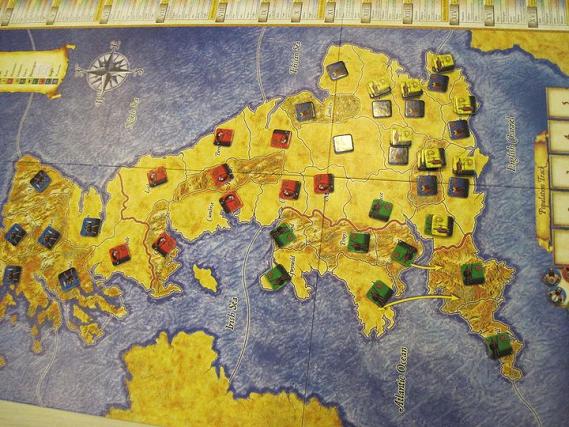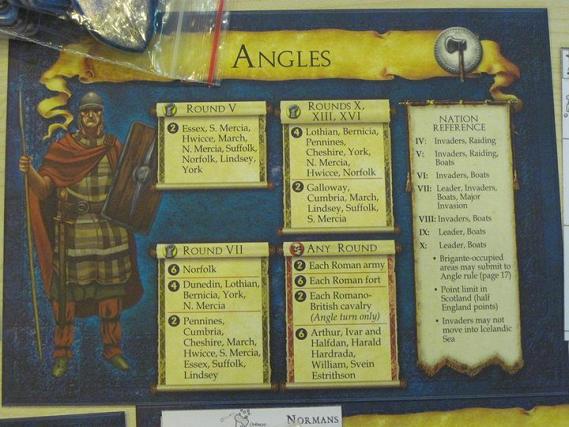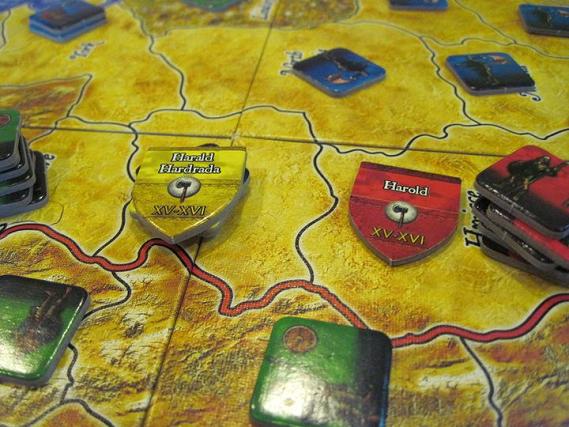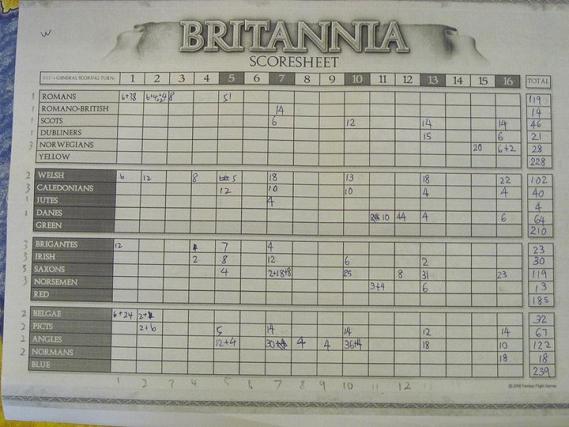
It took some time, but we finally got around to playing Britannia recently. I first read up on the rules over a year ago when we planned on playing this with Han but we never did manage to get our schedules right so we missed out on it. Nevertheless, I never forgot this game and was glad for the chance to play it when Sean brought it up again. The problem with this title was always that it needed exactly four players and that its expected playtime would exceed four hours. In our case, we started rules explanation at about half past seven in the evening and finished well past one the next morning.
The thing with Britannia is that there are only a handful of rules. Combat is handled with a single die roll per unit, much like the Axis & Allies games, and most nations have only a single type of unit. Controlling more territory does give you more units over time, but once again the mechanics are simple. Controlling a normal territory gives you two Population Points. A territory on difficult terrain gives you one. For every six points you accumulate, you get a new infantry. Movement is probably the most complex. Basic movement is easy, two territories if moving through normal terrain, one if moving to a difficult terrain. Things like boats and moving across straits add more options but aren’t too bad.
What really makes the game difficult to learn is the fact that each player controls more than one nation throughout the course of the game and each one has specific scripted events and wildly different scoring requirements. The board itself helps a lot by summarizing what happens in each turn, but it takes a while before players understand how to look out for scripted invasions and how to prepare their deployments to account for scoring turns. To further simulate historical events, there are tons of exceptions to the rules for certain nations at certain times. Specific nations can submit to specific other nations on specific turns if certain conditions are met for example. The Saxons can build a special type of fort but only on certain rounds and so forth. It feels very much like a crude hack and as far as you can get from the sleek elegance of Euro games.

Yet, rather shockingly, the game does work. My wife is not a fan of wargames and did very badly, but she still came away impressed by how cool the game is and how much she learned from it. The early turns were the hardest (especially for those of us not playing Yellow) but once we got into the flow of the game, we didn’t really feel the time passing at all. Despite Sean’s warnings, I don’t feel that there’s much downtime at all. Even when it’s not one of your nation’s turns, what happens is important enough that you feel motivated to pay attention to it and if not, you can always spend time planning out your future moves and looking at opponents’ nation cards to try to work what they’re going to do.
I’m not knowledgeable enough about the era in question to be a good judge of how historically faithful it is (I’m much more familiar with William of Orange than William the Conqueror). But from what I can gather from the historical notes included in the rulebook and from browsing Wikipedia, it does a decent job of summarizing about a thousand years’ worth of Britain’s history in a boardgaming session of several hours. I learned that the peoples roughly depicted as the Scots in the game originally came from Ireland and that the Romans actually made it as far north as Scotland. The game also inspired me enough to read more, so I found out that even the Belgae were originally from Gaul and that the Romans first came across the English channel to attack them as they were allies of anti-Roman tribes in Gaul.
As it turned out, our game diverged from history significantly. Part of the reason was that Sean and Chee Wee had both played the game before and Sean in particular was very gamey about making up for mistakes he had committed in the earlier game. So in our game, the north was a bastion of peace as Sean’s Caledonians and my Picts co-existed peacefully, making it impossible for Shan’s Norsemen or Chee Wee’s Scots to gain much of a foothold. Down south, Sean’s Welsh resolutely shut out Shan’s Irish while her Saxons and Chee Wee’s Norwegians made short work of my William the Conqueror. So much for the Norman Invasion.

Normally I dislike scripted events in games, being much more of a fan of what the videogaming industry likes to call emergent gameplay. This refers to situations that even the designer couldn’t have predicted bubbling up spontaneously as a result of game mechanics and player decisions. But I realize that it would be impossible to make a historical game like that. Even the very complex strategy games that Paradox makes can’t induce historical events from the ground up based on the economic and demographic models alone and must rely on scripts. So as clunky as the invasion events, highly specific scoring conditions and rules exceptions that Britannia uses are, I can see that they’re the most practical solution.
The downside of course is that it gets pretty gamey when players try to maximize their points. I quickly realized for example that my Belgae were supposed to go extinct by design and by far the best thing to do with them was to let them go out in a blaze of glory while taking out as many Roman forts as possible. In real life of course, while the Belgae certainly got wiped out, it wasn’t like they wanted it to happen. They simply wanted revenge for atrocities committed by the Romans. Similarly, it feels weird how nations all want specific pieces of land as if their leaders could peer into the future and how they rise to power and fade into oblivion according to a predetermined schedule. But I guess all that is the necessary cost of using hardcoded scripts.
Overall, I liked Britannia much more than I thought I would and certainly much more than Axis & Allies. The fact that the game is balanced around each player having control of several nations across time means that each player always has at least one moment when his influence across the map is at its zenith and prevents players from being too disappointed while that nation inevitably falls into decline. The map is also small enough that everyone is constantly engaged with one another and the rules are abstract enough that minor details don’t get in the way of the grand sweep of history. It’s still not something I’d want to play too often, but with a committed group of players, enough free time and at least a sprinkling of enthusiasm for the subject matter, I’d say this is a fine game indeed.

2 Responses to “Britannia”
Now that u have played it, wait for the next game where players can start using negotiation and forming short term alliance. Sweet!
PS: Norman don’t score many points anyway, use them to make the other kings cower in fear! Your Angles and Picts did very well.
New player should have play Green, they are mostly defensive until the great Dane arrived.
I sort of had an informal arrangement with Chee Wee’s yellow. I tried to avoid messing with the Romano-British and the Dubliners in the south with my Angles and so his Scots minimized confrontations with my Picts in the north. As usual Sean tried to goad everyone to fight each other, but I think our peacemaking made things a bit easier to deal with for both of us.
Of course, once the three kings arrived, it didn’t stop his Haralda from going straight for William the Conqueror. Chee Wee probably had the best idea of who was winning since he was in charge of recording scores and going for me at that point was clearly his best move.
Leave a Reply